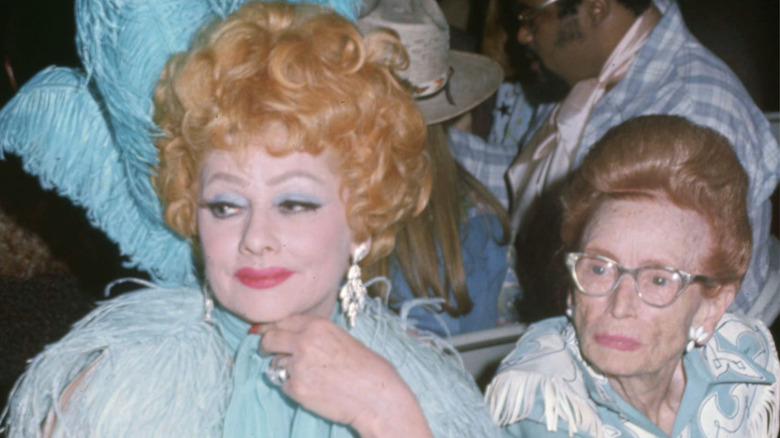Two of television’s most beloved trailblazers, Betty White and Lucille Ball, didn’t just revolutionize comedy on screen — they quietly built a deep, decades-long friendship off screen. Their bond, which began in the late 1950s and lasted until Ball’s passing in 1989, reveals how mutual respect, shared values, and steadfast loyalty can endure in an industry defined by constant change. For fans, their friendship is more than a feel-good anecdote; it’s part of the story of how American television evolved, one laugh and one act of kindness at a time.
From Desilu Soundstages to Lifelong Friends
Their paths crossed in 1957 on a bustling studio lot that would become legendary: Desilu. While Lucille Ball was taping the final season of I Love Lucy, Betty White was across the way filming Date With the Angels. According to multiple accounts, the two performers connected immediately. What began as a backstage hello turned into a friendship defined by warmth, humor, and an unspoken understanding of what it meant to be a woman leading the charge in a demanding business.
Insiders have long noted that White and Ball did not see themselves as mere show business acquaintances. They saw one another as family. That closeness was built on shared work ethic, similar experiences navigating the television landscape, and a joyfully direct way of relating that mirrored their comic styles: what you saw was what you got.
Life Partners Became a Four-Person Circle
As their careers flourished, their personal lives intertwined. In the early 1960s, both women remarried — Lucille Ball to comedian Gary Morton in 1961 after her divorce from Desi Arnaz, and Betty White to Password host Allen Ludden in 1963. From there, the friendship became a true foursome. They spent time together as couples, forming an easy rapport that blended humor, support, and a shared understanding of life lived in the spotlight.
Betty would later reflect that their friendship extended well beyond the industry. During a 2014 online Q&A, she described Lucy as one of her dearest friends, adding that what audiences adored about Ball was exactly who she was in private — dynamite, direct, and delightfully authentic. White once remarked that even though they didn’t share the screen as actors, it felt as if they had worked together, simply because they spent so much time as buddies.
The Mothers Who Modeled Strength

What few fans realize is that the friendship between Betty White and Lucille Ball reflected an even deeper bond between their families. Their mothers — DeDe Ball and Tess White — also became best friends as their daughters’ relationship grew. Betty affectionately called them dynamite mothers, and for good reason. DeDe, a former concert pianist, and Tess, a devoted homemaker, were tough, savvy, and remarkably forward-thinking. They encouraged their daughters to stand tall, know their worth, and push back when the industry tried to limit them.
The influence of DeDe and Tess can be felt in the way both stars charted their careers. They didn’t just excel as performers; they took leadership roles behind the scenes at a time when female-run production outfits were rare. Lucille Ball made television history as the co-owner of Desilu, a studio that became a powerhouse. Meanwhile, in the early 1960s, Betty White co-founded Bandy Productions with partners George Tibbles and Don Fedderson. Their parallel paths underscore a vital truth: their achievements weren’t accidents but the product of vision, discipline, and guidance from women who taught them to be fearless.
Building More Than Careers
Both women enjoyed long arcs of success — from Ball’s game-changing sitcoms to White’s late-career renaissance that delighted new generations. Yet behind the accolades, Emmys, and unforgettable punchlines was a friendship shaped by presence and consistency. They showed up for milestones, offered honest counsel, and made room for one another’s joys and heartbreaks. Those small, human moments add depth to their public legacies and help explain why their names still evoke such affection today.
Loyalty Through Triumph and Loss
No enduring friendship is without its private trials. In the late 1970s, as Lucille Ball faced the failing health of her mother, she pulled Betty aside at a party and voiced a fear that many children eventually face: What am I going to do if I lose my mother? It was a vulnerable moment between two women who were used to playing the strong ones — and it forged an even tighter bond.
When DeDe Ball passed away in 1977, Betty recalled that Lucy, in her grief, reached outward. She began to look after Tess White as though she were her own. Every year on DeDe’s birthday, Lucy would send Tess a basket of violets — a thoughtful ritual that said more than words could. It was a gesture that turned loss into remembrance and friendship into family.
Two Icons, One Lasting Example
In a field that often prizes competition over community, the relationship between Betty White and Lucille Ball stands out as a model of mutual uplift. They celebrated each other’s wins. They listened when the spotlight felt heavy. They respected one another’s craft and championed one another’s independence. Their personal alliance mirrors the public optimism that defined their comedy: sharp, generous, and always grounded in humanity.
For fans of I Love Lucy, The Lucy Show, or The Golden Girls, this story adds an extra glow to their beloved episodes. Laughter, it turns out, was both their profession and their shared language. The warmth viewers felt through the screen was the same warmth they gave each other off camera.
Lessons in Collaboration and Respect
There is a quiet power in the way White and Ball navigated their lives: surround yourself with people who believe in you, build structures that let your work thrive, and keep your sense of humor when the stakes are high. Their example encourages today’s creators, especially women, to claim leadership roles, form trustworthy circles, and define success on their own terms.
Why This Friendship Still Resonates
The legacy of Betty White and Lucille Ball isn’t only about pioneering sitcoms or ratings records. It’s about how kindness can coexist with ambition, and how friendship can be the bedrock of a life spent breaking new ground. Their 30-year bond reminds us that greatness rarely happens in isolation. It grows in community — on studio lots, around dinner tables, and in the quiet rituals that keep memories alive.
As audiences continue to discover their work, the story behind the scenes adds meaning to every laugh. Lucy’s boldness and Betty’s warmth, shaped by two remarkable mothers and strengthened by steadfast partners, offer a blueprint for enduring connection. In an era that moves fast, their friendship invites us to slow down, show up, and stay loyal.
That may be the most timeless lesson of all: the funniest people can also be the kindest — and that kindness is what turns colleagues into family, and legends into lasting icons.
